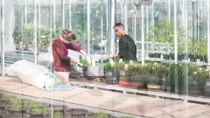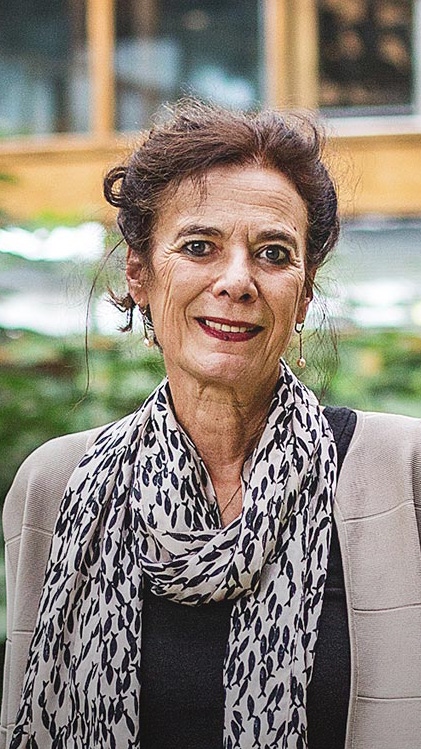Priopćenja i novosti
Interview
Professor Louise O. Fresco, President of the Executive Board at Wageningen University & Research in the Netherlands, has devoted her career to understanding the global food system. Here, she explains how we can change that system for the better.
Creating Chemistry: Your university’s motto, “two times more with two times less,” describes the challenge of feeding the world sustainably by 2050. Are we on track to achieve this?
Professor Louise O. Fresco: I think we must make a distinction between having an ambitious aim and the timeline for implementation. This will take time, but when you see the enormous inefficiency in how everything from land, water and chemical products to labor is being used today, you see how much improvement is possible. Look at how we have dealt with wheat rust in the Netherlands. We have decreased the application of chemicals by about 90 percent through better management techniques, and yields have increased substantially. There are many countries where yields can still go up and efficiency can be improved. So yes, I think we should have it as an aim. There may be countries where it is not possible. But if you don’t have an ambitious goal then you’re not going to get there.
What does the idea of a sustainable food system mean to you, and has your understanding of it evolved over the course of your career?
I come from a systems thinking school. Even before the term sustainability became widespread, we knew that you had to look not just at the crop but also at the environment, social conditions and so on. Over time we have come to understand much more about the impact of agriculture on the environment in all kinds of ways. An awareness of increasing productivity and efficiency goes hand in hand with an awareness of sustainability. You can’t be efficient without being sustainable and you can’t really protect nature unless you have a sound agriculture. So the way we look at sustainability, and the way I personally look at it, has evolved in some ways, but not the fundamental systems thinking behind it – that’s always been there.
How are science and technology helping to achieve sustainability rather than just efficiency?
There are a huge number of examples of this. The fastest-growing area in food production is actually aquaculture, which has had a lot of problems with antibiotic use and water pollution. But there are systems now where, for example, you can filter the water through shellfish and then reuse the effluent water for irrigation. There has also been a lot of breeding work in plants, but this has been focused on increasing yields and not necessarily on nutrients. You want a plant that has tolerance to pests and diseases, and which is also nutritious. It’s a systems perspective about the totality of how land, inputs and water are used.
There is definitely potential for Africa to feed itself, if you look at the amount of land still underutilized.”
You have previously suggested that a certain level of meat consumption helps us to achieve the planet’s full ecological potential. What do you mean by that?
Meat is a large category and there’s a big difference between pigs and poultry on the one hand, and ruminants such as beef and dairy cattle on the other. There are many areas in the world where you cannot grow crops, so in terms of using the full biological potential of the planet, such land can be used by cattle, which convert the vegetation into meat or milk for humans. Pigs and poultry can digest food waste and leftovers. About 35 percent of all food that is produced is currently wasted. We can use that sustainably by letting it be digested by other animals. From a health perspective, while developed countries may eat on average too much meat, in a large number of countries animal protein consumption is very low. So, from a sustainability point of view, it would be unwise to have a total moratorium on meat.
Nobody wants to visit a low-tech dentist or live without electricity, but many people in the West romanticize “natural” or old-fashioned food production. Why do you think that is?
My book Hamburgers in Paradise: The Stories Behind the Food We Eat analyzes this problem. Most people, especially in urbanized areas, no longer have a realistic idea about how food is produced. What you see in the media is often some of the worst cases of animal welfare or overuse of chemicals. So, the perception that something is fundamentally wrong with our food system is deeply ingrained. Many may think things are getting worse, but it’s simply not the case – not in our food production, not in food prices, and not in the environmental effects of food production. The world is actually much better off than it was half a century ago.


At Wageningen University, research is carried out to improve yields and nutritional content of important crops, and to understand the effects of climate change on plants.
Future global population growth will be concentrated in Africa, where most food is produced by smallholders. What are the most effective and sustainable ways of improving their relatively low yields?
There is definitely potential for Africa to feed itself, if you look at the amount of land still underutilized. We need to modernize the farming system towards new methods where mechanization, in whatever adapted form, plays a role. Sub-Saharan Africa has hardly any irrigation, for example; only 3 to 4 percent of land is irrigated. There is enormous potential there, and for having two crops a year. But you need concerted efforts to improve the policy environment. Governments and others, including the private sector, need to invest in a modern system and provide incentives for a new generation of farmers. I am optimistic, though, that the private sector – including seed companies, chemicals and fertilizer companies, and banks – is looking at how to work together to help farmers towards modernization.
How do we ensure that urban populations in Africa have access to a healthy diet, and what is the role of the private sector?
There is no food production without the private sector anywhere, of course, including Africa. What is important, I think, is that the private sector realizes that they have an important role in the way the whole food chain is organized. Supermarkets are increasingly becoming important in Africa and they can really play a role by engaging with consumers and citizens, farmers and producers. We also need a lot of investment in food processing, cold chains and slaughterhouses to healthily feed these growing urban populations. But it takes a concerted food policy and a concerted engagement between the government and the private sector.
Increasing productivity and efficiency goes hand in hand with an awareness of sustainability.”
Can you give an example of a country that has been particularly successful in addressing agricultural and nutritional challenges, and from which others can learn?
There’s not one country that I know of in the world – including developed countries – that really has a coherent and integrated agriculture and food policy. But there are a number of countries that take agriculture and food seriously both from a domestic and export point of view. One is Ethiopia, where I think they do have a good national policy and they’re trying to work with small-scale farmers and integrate them with the private sector. Vietnam is also interesting because out of nothing they have organized an enormous industry in coffee and also one in aquaculture. Every country has its own unique potential but I’m always a bit worried about the idea of countries copying one another. You can be inspired, but your experience has to be linked to the specific conditions and culture of your country. Let’s make sure that knowledge and training are accessible. That’s the most important thing.
Do you think that we will see an end to global hunger and malnutrition in your lifetime?
It depends on the causes of hunger and malnutrition. If you look at where the hungry people are today, most of them are displaced people in areas of civil unrest. This is not a matter of production potential but of political tensions. Then there is a larger group of people that are not acutely hungry but do not have a full balanced diet. There is also an increasing group of poorly nourished overweight people in developed countries. For them, an increase in productivity and income will be beneficial. If I had a magic wand and could do something about civil unrest and wars, then I would be 100 percent sure. But from a purely technical point of view, I think it’s absolutely possible. With our current techniques – let alone with modern techniques in the pipeline – we can definitely feed the world in a healthy and sustainable way.





